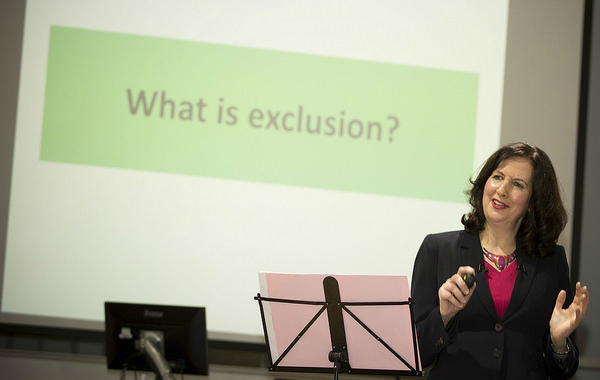
On 26 July I will have the great pleasure of standing up in front of more than 600 people and talking. For 8 whole minutes.
When you can hear your own voice, this is a nerve-wracking prospect; when you cannot, even more so! Will the microphone start making weird noises you cannot hear or monitor? Will I ‘deafen’ the listeners but pitching my voice too loudly, or the opposite? Will I stumble on my words, however well rehearsed ...?
Deaf speakers need to have greater faith in the audience. You need them to trust you and be ready to adapt and tune in to your voice. Let’s face it, it would be easier not to do it and leave it to the hearing speakers.
But deaf voices tend to go unheard, and they have as much value as hearing ones. They tell of a different set of experiences and give a fresh perspective. So the nerves, the borderline terror, is worth it. There is something magical about the bond which can be created between a speaker and listeners if it works; a golden thread between you and them which, sadly, is often missing in everyday life. 600 people ready to listen to you – wow!
The event I am speaking at is the Arts Marketing Association’s annual conference in Belfast. The conference theme is ‘The Value of Everything’. Its emphasis on cost versus value and how to reach broader and more diverse audiences and clients is timely. My subject is social change and the even greater value of the arts to support people through this.
Inequality has increased in the UK alarmingly over the past decade. An apparent greater tolerance of an ever-rising proportion of poverty our society which is the 6th wealthiest in the world, is not only worrying, it indicates a seriously malfunctioning society and economy. When people can contribute their skills and experience, a society works better and is better. Feeling part of something bigger is vital to us all.
The upheavals we are all feeling, the uncertainty of recent events and the likelihood of even greater poverty increase the need for the relief,stimulation, peace and mental well-being which the arts can offer. What better way to put aside your worries than becoming absorbed in a good film, a play, a concert or a thought-provoking exhibition?
But are ‘arts for all’? What about people on the margins of society? Essential life goods such as fuel, food, clothing and travel have all increased in price more rapidly than other things. So if you are on the breadline, the proportion of your income taken up by these things is already high so any disposable income you have is reduced faster than for those with more to spare. Entrance fees and ticket prices will often eat up too much of this. And if you are deaf or disabled often events or attractions are not accessible, so your options are far more limited.
The problem with this is that it is harder to be just about managing (or worse) and to be deaf or disabled or living with a long-term health condition. If you are in these groups, you need the benefits of the arts more. It is not an exaggeration to say the arts could have a life-changing (or saving) impact. Sometimes all it takes to avoid ‘going over the edge’ into serious depression or isolation, is exposure to something that gives you head space, lets you reflect, allows you to feel human and ok. But when you see the plethora of arts on offer, but only a fraction is open to you, for either cost or access reasons, that can make you feel worse than if you were not aware of everyone else’s choices.
To take one small example, I love film. For me there is no better way of forgetting about day-to-day worries than sitting in the dark and watching a great film. To access film at the cinema I need captions. Out of interest, I did a quick check of how many cinemas are within reach of where I live near central Manchester. There are at least 10 and at a very rough calculation, between them they provide 8,000 showings per week.
How many screenings do you think are captioned?
18.
That’s 0.2%. Yet the percentage of adults with hearing loss (and not taking into account others who may benefit from captions such as those with English as a second language) is around 16%.
There is no easy or quick answer to this, but it is important. In my 8 minute talk I will be aiming to inspire some new approaches and ideas tothe issues among the creative experts attending in Belfast. I am an optimist and I believe that the combined powers of this influential group will produce some ideas to surprise, cheer and include us. I look forward to seeing it happen!
At Result CIC, we are keen to work with the teams at arts organisations to strengthen confidence through diversity.
Interested? Get in touch.